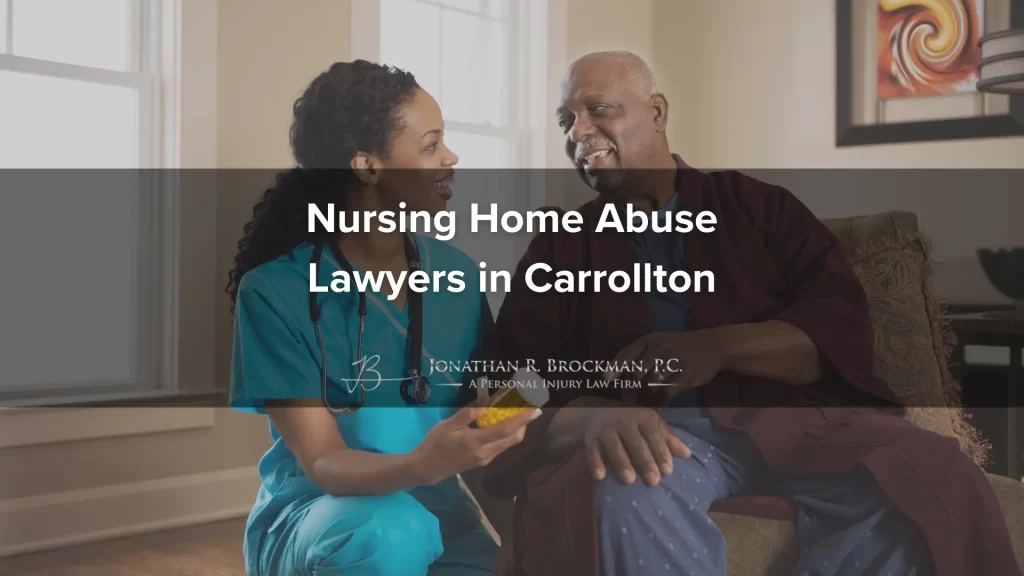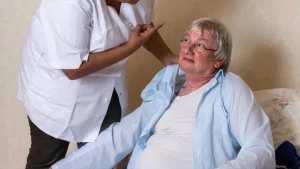
We want nothing but the best for our families. When it comes to making the immensely difficult decision to hand over the care of a family member to a nursing home, you want to know they are in caring and compassionate hands. Yet, no matter how hard you search, no matter how fantastic the facility seems, nursing home abuse can still happen. It can happen anywhere, in any type of facility.
You do have the power to fight back against nursing home abuse, and law firm of Jonathan R. Brockman, P.C. can help. Our experienced Carrollton nursing home abuse attorneys will take your concerns seriously, conduct an investigation into the abuse, and use the legal system to hold the responsible parties accountable.
If you suspect that a loved one may be suffering from any form of abuse while living in a nursing home setting, contact us at 770-205-8887 to schedule a free case evaluation. No one should be made to suffer, especially when it means tainting the golden years of life.
What Is Nursing Home Abuse?
Nursing home abuse is a complicated matter. It isn’t as simple as a caregiver “roughing” up a patient, although that is typically what comes to mind when people think of abuse. Nursing home abuse can be a complex pattern of behaviors that harms or injures an elderly resident in several different ways.
The general definition of nursing home abuse is any type of harm that befalls an elderly nursing home resident perpetrated by someone in authority. The definition of abuse doesn’t refer to physical violence; it simply states that abuse is considered any type of harm directed at a resident.
Forms of Nursing Home Abuse
Since the definition of abuse is so broad, it is important to thoroughly explore all the different forms of abuse that a caregiver may inflict on residents. Abuse may not always leave a physical mark or scar, so it can be hard for family members to determine if their loved one is being properly looked after.
This is especially true since many residents are often afraid to come forward with allegations of abuse, either because they have been threatened or they fear staff members won’t take their claims seriously. So, what does nursing home abuse look like? The most common forms of nursing home abuse include:
Physical Abuse
Physical abuse is the act of physically laying hands on an elderly nursing home resident. This violent act can be any type of physical activity, including pushing, shoving, hitting, kicking, slapping, or even biting.
Emotional or Psychological Abuse
While physical abuse leaves physical marks or scarring behind, emotional abuse can leave deep scars on the mind and cripple a resident’s psychological health and well-being. Emotional abuse happens when a caregiver uses verbal threats, humiliation, yelling, berating, name-calling, or isolating as a means of harming a resident.
Sexual Abuse
One of the most underreported forms of abuse in nursing homes is sexual abuse. The shame and stigma surrounding this type of abuse may keep victims from coming forward, even to their closest friends and family. Sexual abuse is any form of unwanted sexual contact or sexual contact that a resident cannot consent to. Rape, fondling, being forced to watch graphic materials, being forced to take graphic photographs or videos, are all examples of forms of sexual abuse.
Financial Abuse
You may be aware that the elderly are frequent targets of scams, but did you know that type of behavior has a name. It is financial abuse, and it can happen within the walls of a skilled nursing home facility. One study conducted by MetLife found that financial abuse costs elderly Americans $2.9 billion annually, and the problem continues to grow.
Financial abuse may be a caregiver exploiting a resident’s trust for a scam or fraudulent investment, but it may also include stealing items directly from a resident’s room, taking bank information for their personal use, or forging checks.
Neglect
While neglect is the absence of care or interaction with a resident, the National Center on Elder Abuse categorizes neglect as a form of nursing home abuse. Neglect is a pattern of behavior that deprives a resident of their medical needs, basic living needs, or even social needs. Neglect isn’t a one-time forgetful act or mistake; neglect is a systematic pattern of behavior that detracts from a person’s quality of life.
Circumstances Leading to Nursing Home Abuse
Nursing home abuse can happen anywhere, even in the most affluent facilities with elaborate dining options, pools, and shining marble floors. There are several common denominators between all types of nursing homes that can contribute to abusive situations. If you are looking into placing a family member into a skilled nursing home facility, here are some things to consider:
Number of Staff Members
This is one of the most crucial statistics to bear in mind when it comes to nursing homes. Why? It is because chronic understaffing is one of the most significant causes of nursing home abuse, and tens of thousands of nursing homes have staff levels considered too low for adequate resident care.
Understaffing can lead to caregivers being so overwhelmed that they neglect the needs of residents, especially if those residents require extra care or attention. Understaffing can also lead to the emotional and physical strain on staff members who then take their frustrations out on residents. Understaffing may also contribute to caregivers feeling resentment towards residents, so that lashing out at them becomes an outlet.
Staff Training
Nursing homes are required to ensure that all their staff members are trained in proper nursing home procedures and protocols. All staff members must have adequate access to resources and supervision. Staff members not being properly trained in the nursing home protocol or who lack proper supervision may neglect the needs of residents or make critical medication errors.
Hiring Practices
Skilled nursing homes are medical facilities. To work as a caregiver in this type of setting, staff members must have the proper educational training and background. A nursing home facility should be conducting complete and thorough background checks on all potential employees. This process is meant to screen candidates for the proper medical education and training, while also looking for red flags such as a criminal background. Forgoing these checks can mean that a nursing home is hiring people ill-suited to working in a caregiving environment, which can lead to abusive situations.
Poor Administration
Keep in mind that most nursing home facilities are, in fact, businesses. They are operations that run to generate a profit. Some facilities with a poor management structure value that profit over the health and safety of their residents, leading to mismanagement and abuse. Negligent use of resources, inadequate pay for staff members, chronically understaffing the facility, are poor administrative practices that hurt nursing home residents, and contribute to abuse cases.
In severe cases of mismanagement, some nursing homes resort to hiding or stalling abuse complaints to maintain their reputation, keep profits high, and avoid government fines and expensive lawsuits.
Warning Signs of Elderly Abuse
 Statistics from the World Health Organization found that only 1 in 24 cases of elder abuse is ever reported. The organization admits that those numbers are likely underestimated and that there are many more cases of elder abuse, especially in nursing homes, that are not being taken into consideration.
Statistics from the World Health Organization found that only 1 in 24 cases of elder abuse is ever reported. The organization admits that those numbers are likely underestimated and that there are many more cases of elder abuse, especially in nursing homes, that are not being taken into consideration.
Why is that? Abusers may threaten victims to keep them silent about the abuse. Abusers also tend to choose victims who are unable to communicate that abuse is taking place – for example, abusing residents with cognitive conditions like dementia. These victims may lack the ability to communicate or, because of their condition, their allegations aren’t taken seriously.
Understanding these factors is important because it means that family members are the greatest advocates for their loved one’s health and safety. Here are some of the most common warning signs that abuse may be taking place:
- Unexplained broken bones, cuts, or bruises
- Frequent falls or repeat injuries
- Frequent infections or illnesses
- Burns
- Marks or bruises near or on the genitals
- Sudden trouble sitting or standing
- Bloody underwear or bed linens
- Refusing to cooperate with specific staff or caregivers
- Anxiety
- Depression
- Withdrawal from favorite activities or pastimes
- Withdrawal from family or friends
- Changes in sleeping or eating patterns
- Lack of eye contact
- Sudden changes in weight or appearance
- Sudden or unexplained changes in a medical condition
- Dehydration
- Malnourishment
- Change in a financial situation
- Poor hygiene or change in hygiene
- Unchanged or dirty clothes, bed linens, or bandages
How Jonathan R. Brockman, P.C. Can Help Nursing Home Abuse Victims
The Carrollton nursing home neglect attorneys at Jonathan R. Brockman, P.C. understand that your main priority is making sure that your loved one is in a safe and stable environment. We want to help make sure that your loved one gets the care they need and the compensation they deserve. Nursing home abuse is serious, and there should be consequences for all negligent parties involved. We will work to hold those parties accountable and safeguard the health of your elderly family.
Contact Jonathan R. Brockman, P.C. at 770-205-8887 for a free case evaluation. We can help you free your family member from the cycle of abuse.
